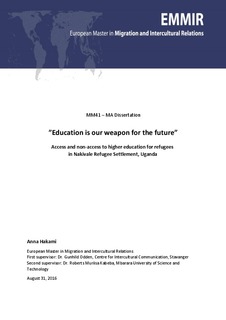| dc.contributor.advisor | Odden, Gunnhild | |
| dc.contributor.advisor | Kabeba, Roberts Muriisa | |
| dc.contributor.author | Hakami, Anna | |
| dc.coverage.spatial | Uganda | nb_NO |
| dc.date.accessioned | 2016-10-17T08:57:37Z | |
| dc.date.available | 2016-10-17T08:57:37Z | |
| dc.date.issued | 2016-06 | |
| dc.identifier.uri | http://hdl.handle.net/11250/2415482 | |
| dc.description | Master's thesis in Migrations and intercultural relations | nb_NO |
| dc.description.abstract | Access to higher education for refugees is limited and under-researched. Within the context of protracted refugee situations in the Global South, the relief focus of humanitarian assistance, as well as the lack of integration policy, restricts refugees’ living conditions and chances of being able to access further education. With a theoretical base in refugee studies and sociology of education, this study explores the conditions for access to higher education, by using a case study from Nakivale Refugee Settlement in Uganda. Following a qualitative research approach – interviews with education officers, but mainly refugees inside and outside the educational system – serves to demonstrate opportunities for and barriers to higher education, as well as provide accounts for lived experiences of access and non-access to education. The study also focuses on the refugees’ perspectives on their future and the end to their individual refugee situation, and what role higher education is perceived to have in relation to that. Findings suggest that although there in principle are no restrictions for refugees to access higher education institutions in Uganda, in practice there are structural constraints and various barriers which prevent access. In Nakivale Refugee Settlement there is a major discrepancy between educational realities and educational aspirations. Different future plans among the respondents, that challenge the dominating discourse of repatriation as the one solution to refugee situations, show how higher education is seen as having an important role in the preparation for all possible futures, and especially for an uncertain future which lies ahead for many refugees. Findings also point to how refugees have particular experiences related to being beneficiaries of humanitarian aid and having refugee status, thus being within a preserved dynamics of exclusion. | nb_NO |
| dc.language.iso | eng | nb_NO |
| dc.publisher | University of Stavanger, Norway | nb_NO |
| dc.relation.ispartofseries | Masteroppgave/UIS-HF-IGIS/2016; | |
| dc.rights | Navngivelse 3.0 Norge | * |
| dc.rights.uri | http://creativecommons.org/licenses/by/3.0/no/ | * |
| dc.subject | migrasjoner | nb_NO |
| dc.subject | interkulturelle relasjoner | nb_NO |
| dc.subject | utdanning | nb_NO |
| dc.subject | flyktninger | nb_NO |
| dc.subject | higher education | nb_NO |
| dc.subject | protracted refugee situations | nb_NO |
| dc.subject | Uganda | nb_NO |
| dc.title | "Education is our weapon for the future": Access and non-access to higher education for refugees in Nakivale Refugee Settlement, Uganda | nb_NO |
| dc.type | Master thesis | nb_NO |
| dc.subject.nsi | VDP::Social science: 200::Human geography: 290 | nb_NO |

